Professional Cyclist Ian Boswell Talks Falling Down, Getting Up and the Road Ahead
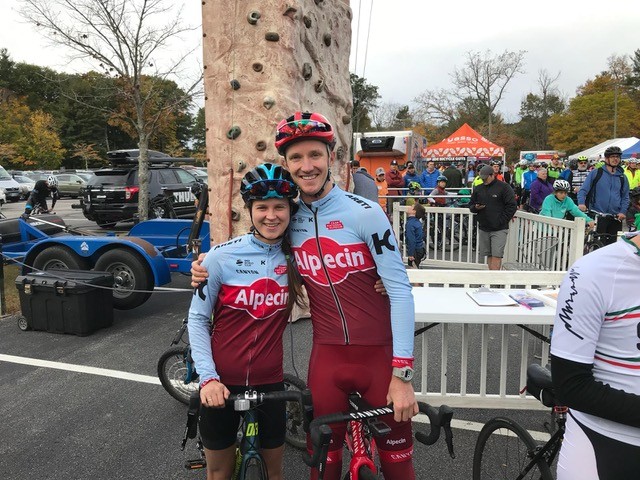
- Courtesy of Ian Boswell
- Gretchen and Ian Boswell
The 28-year-old professional cyclist was four months removed from a devastating crash during the Tirreno-Adriatico race in Italy. Knocked unconscious, a helmeted Boswell suffered a severe concussion — his sixth. Afterward, he spent a brief amount of time at his European apartment in Nice, France, before returning home to Vermont to recuperate.
“Following the crash, I didn’t ride for two months, which was the longest I haven’t ridden since I was probably 14 years old,” Boswell said. “It’s always been a part of my life and identity.”
Now about six months removed from the March wreck, Boswell is still working his way back into the saddle. He’s not planning on riding again this year for his team, Katusha Alpecin, and hasn’t been able to train like he would for the pro circuit.
The crash has “thrown a big speed bump into everything,” Boswell said.
That’s not to say he’s been idle. In May, Boswell married his partner, Gretchen, in a ceremony on their Peacham property. And he’s incorporated meditation, yoga and sessions in a hyperbaric chamber into his routine in an effort to center himself and his mind.
Lately, he’s been prepping for the second annual Peacham Fall Fondo, a 45-mile tour of the gravel roads in his neck of the Northeast Kingdom. He and Gretchen created the event last year and hosted some 185 riders. A portion of the proceeds from this year’s ride, on September 21, will benefit the LoveYourBrain Foundation, an organization started by former professional snowboarder Kevin Pearce, a Vermonter who suffered a traumatic brain injury while training for the 2010 Winter Olympics.
Boswell spoke with Seven Days by phone recently about falling down, getting up and what’s coming down the road.
This interview has been edited and condensed for length and clarity.
SEVEN DAYS: Tell me about the crash at the Tirreno-Adriatico.
IAN BOSWELL: It was stage four. We were on a descent. I’m still not really clear what happened, but I crashed. I’m not sure if someone overlapped my wheel or I hit something in the road but I wound up going over my handlebars at 40 miles per hour and pretty much taking all of the blow to the back of my head and neck. I was unconscious. Unfortunately, Gretchen was in Europe watching the race on TV and the camera panned on to me and they were filming me just unconscious, lying in a contorted position in the middle of the road.
At the time it didn’t seem like anything too severe.
SD: Whoa, whoa, whoa. What do you mean? That sounds pretty severe!
IB: It is, but I was so out of it from being unconscious for awhile that by the time the ambulance had come for me, I was like, "Let me get back on my bike so I can finish the race." And unfortunately, the mentality of cycling is like, you just want to get back on your bike. Fortunately, the team doctor was back at the bus watching the race and the team director was like, "No, you’re not OK. You’re going to go back in an ambulance to the bus. Your race is over."
That probably would have been the end of it because oftentimes, athletes are kind of the worst at diagnosing injury. We like to just sweep it under the rug and not think about it too much. Luckily the team doctor was there and had seen it and we got in a car and went straight to the hospital for scans and X-rays and spent overnight in a hospital in Italy for observation.
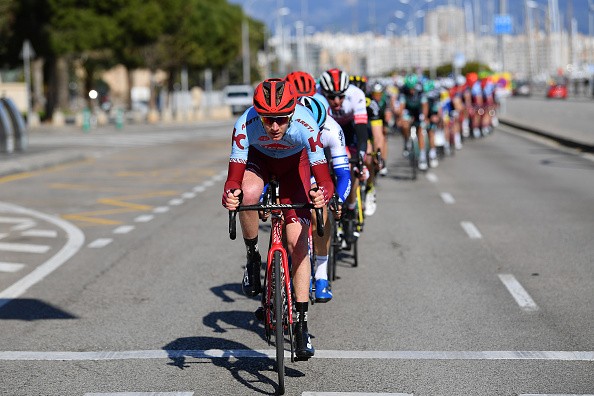
- Courtesy of Ian Boswell
- Ian Boswell in a race
Related Pro Cyclist Ian Boswell Creates Home, and Fall Fondo, in Peacham
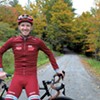
Pro Cyclist Ian Boswell Creates Home, and Fall Fondo, in Peacham
By Sasha Goldstein
Outdoors & Recreation
Gretchen flew back to the U.S., so I kind of had my freedom. I didn’t have any constraints, people telling me to hold back. I tried to start riding my trainer again and it was pretty apparent that I wasn’t OK, that I was still very symptomatic. My racing mentality and sporting side was like, OK, you gotta get back to it. You’ve taken the week off, it’s time to get back in the saddle. It was apparent I wasn’t ready, and the decision was made between the doctors, my team and myself that I would return to the U.S. and seek more therapy here.
SD: When you say it was apparent that you weren’t ready to ride — were you dizzy? What were your symptoms like?
IB: I was getting a lot of headaches and dizziness and blurred vision and kind of confusion. In Nice, where I have my European base, it’s somewhere that I’m very comfortable. It’s a city, there’s a lot of noise and traffic and I just felt very uncomfortable. I wasn’t able to drive at all so I was walking to the grocery store and whatnot, and just the stimulation of being in a city was really bothersome to me. It was difficult to be in that kind of environment.
The decision was made to come back to Vermont, and I started seeking professional help down at Dartmouth-Hitchcock, which has been really helpful.
SD: Were you ever diagnosed with a traumatic brain injury or what did they ultimately find out?
IB: It was pretty much the concussion. This was something like my sixth pretty serious concussion. On the MRI, they found brain bleeding in a prior concussion, which I wasn’t scanned for. But there was no brain bleeding, which was the major thing they were looking for.
It’s been a long process from when I came back in April to now. It’s been a journey and a very perspective-gaining experience on recovery from something like this. I define it as an invisible injury because I’m here talking on the phone with you, I’m still riding my bike once in awhile and am largely normal, but I’m not yet back to the level where I can train in order to be ready for racing.
SD: Is that based on how you feel or what the doctors are telling you?
IB: It’s a combination. That’s the unfortunate thing with a concussion. There’s no real scan or test they can do to tell you when everything’s healed. You can’t really go and look at your brain until you’ve had an autopsy done after you’ve died [laughs]. It’s not like a bone where you can do an X-ray and say, "OK, the bone’s healed, you can get back on your bike." It’s very much based off the symptoms.
Because I’m still experiencing the symptoms, there’s a lot of evidence to show that my brain hasn’t fully healed yet. The doctors say there’s no point in returning to racing, especially if you’re not able to train enough to race. And you’re also putting yourself and everyone else at risk if you’re not able to be in the confined space of a peloton, racing at full speed.
If I’m riding by myself and doing a couple hours, I can choose my risk factor. When you’re in a race, you don’t have any [control] over the risk that people are choosing to take on defense. At dangerous points in the race, you’re kind of just following along.
SD: How are you feeling now?
IB: That’s been one of the most frustrating things of this recovery process: It’s not always linear. A lot of sports injuries, something happens, you’re injured, you gradually get better. Then there’s minor setbacks along the way or whatever, but nothing major.
In June and early July, I was training a fair bit, really motivated to get back to racing this year having missed so much of the season and having missed the Tour de France, which was my big goal again. Everything was going pretty well and for whatever reason, maybe I was doing too much, a lot of my symptoms came back in the middle of July. Headaches and dizziness — very typical post-concussion syndrome symptoms — and so I really had to back things off.
I’ve continued with my vestibular therapy and have actually been going to a hyperbaric chamber up in East Hardwick, which has really helped with my headaches — just the increase of oxygen in your blood system. I’ve just really had to back off my serious training. It’s been very much a process in being real and honest with myself and where I’m at.
SD: You’ve had six concussions now, you’ve read about CTE, you’ve heard about the issues with brain injuries. Is this something where you’re thinking about your future in professional cycling or are you not at that point yet?
IB: It’s a difficult question to answer because as you get older, you definitely gain a lot more perspective on things like that. I’ve had plenty of hits to my head when I was younger in my career, and there was never a question of getting back up and getting back to it as quick as you can. Now I’m not like I used to be and I have to be real with that.
My team has been extremely supportive of me staying home and getting the help I need. They’ve never rushed me or pressured me to get back before I’m ready, which has been great.
As far as the future, I haven’t made any decisions yet. I love riding my bike, and that’s one thing I’ve realized through this process is that I really love riding my bike [laughs]. So that’s been important to me.
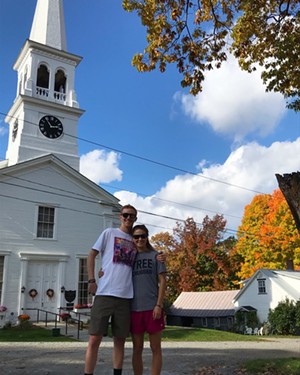
- Courtesy of Ian Boswell
- Ian and Gretchen Boswell
SD: Tell me about LoveYourBrain. Kevin Pearce is from the Upper Valley and is a former pro athlete who’s dealt with head injuries. How’d you first hear about the foundation and what’s your involvement with it?
IB: My vestibular therapist at Dartmouth-Hitchcock gave me a pamphlet and said, "Hey, this would probably be a really good asset to your recovery process." Gretchen and I signed up for a course. Gretchen did a caregivers retreat down in Hartland — at the Pearce residence, actually — back in July. We connected with [Kevin’s brother] Adam Pearce and Kyla, his wife, who run the organization. We told Adam about our Fondo, told him that head trauma and people recovering from it has become very personal for me, and the course has been such a beneficial aspect to my recovery and it just kind of made sense to make them the beneficiary of our Fondo this year.
Related Kevin Pearce, Former Pro Snowboarder and TBI Survivor, Rises Again
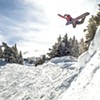
Kevin Pearce, Former Pro Snowboarder and TBI Survivor, Rises Again
By Ken Picard
Health + Fitness
SD: What has been the hardest part of the whole recovery? Is it thinking about getting back on the bike or something else?
IB: Initially, it was a bit of an identity crisis. All of a sudden, I’m this professional athlete and I wanted to go to the Tour de France, and then [the crash happened] and, what am I supposed to be doing? My whole adult life has been geared toward very specific goals and targets and timelines.
In the beginning of my recovery, I set a lot of timelines and a lot of deadlines: OK, by this date I’ll be riding again, and this date I’ll be able to race again. That was definitely a hinderance to my recovery because I kept disappointing myself when I wasn’t able to return to training on a certain date. Just being here, coming back to Vermont, and thinking, What am I really doing? I’m not doing anything, really. It’s very hard for me to just be putzing around.
I’ve had a lot of difficulty also with the perception of it all. For a while, I was completely off social media because phones and computer screens were causing me a lot of difficulty. Eventually, I slowly reentered that world of social media but then with that came a lot of perception about my recovery.
I posted a picture of Gretchen and I picking blueberries or getting ice cream or something, and I felt a lot of guilt when people would say, "You look fine." I don’t have a cast on, I’m not limping, I’m not hooked up to an IV or something. I appear very fine and normal and that’s why I say it’s been an invisible injury, almost.
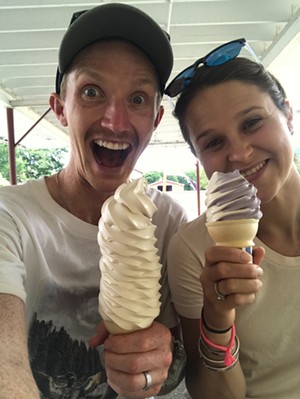
- Courtesy of Ian Boswell
- Ian and Gretchen Boswell
There’s been difficulty as well with my emotional side, my mental state. It’s just changed. I’m doing what I can to work on it. I’m working with a therapist on my attitude and the emotional side of things and how I deal with things. It has been a big shift in my life and who I am and what I’m doing.
A lot of it is internal pressure, as well. I’m kind of in the prime years of my career and your career is only so long. Not racing for a whole season, essentially, is a long time. With every passing race or month that I’m ineligible from returning, it’s becoming more difficult to find a contract and a job for next year because my contract is up this year.
SD: I imagine it’s been a very difficult time but also interesting one in where you’re trying to figure this whole thing out.
IB: It’s been very challenging in a lot of ways but it’s also been very insightful. Just taking a step back and realizing that at some point, there is an end to your professional athletic career. There’s going to be a transition eventually. I’m not going to race my bike until I’m 50.
In a lot of ways, it’s made me really appreciate the things I have been able to do for the past 10 years of my life. Traveling the world and racing a bike, it’s like, wow, that’s pretty awesome. Then you take it for granted when it’s your day-to-day life. You don’t appreciate it as much as you do when you have something that takes it away from you.
SD: It sounds like part of your recovery and a way you’ve kept busy has been planning for the Peacham Fall Fondo.
IB: One of our fears last year was about how the community would embrace the event. It’s bringing a lot of people in, it’s a very different event. It was the first time Peacham had ever set up a beer garden in a public space. We were a little bit worried. But very quickly after the event, a lot of the folks in the community were asking, "When is the ride going to be next year?" So we were quickly like, "I guess we’re going to do this again," and I guess it was a success in a lot of ways.
Gretchen, largely, has been doing the logistical side of it. We moved the date up a couple of weeks in hopes of better weather — it’s September 21 this year. It’s very similar to last year. We want it to be a very fun event. We have some surprise gifts for people who maybe aren’t riding as fast.
We’re really just trying to foster this community of people getting on bikes and enjoying riding together and communicating with people and making those connections — similar to what I’ve been able to do with LoveYourBrain. Bringing people together who maybe don’t know each other and enjoying a fun event together. We’ve added a 5K kids ride this year to bring more families out.
The event is growing. Our ambition is keeping it very Peacham, keeping the community involved. Our community is only so big, we can only handle so many people.
SD: You talk a lot about Vermont and living in Peacham. What’s it been like spending more time there?
IB: It’s been pretty phenomenal. There’s been a ton of community support, especially when I first came back. It’s a small town, so word spreads quickly. We received all sorts of cards on our porch and in our mailbox from people just sending thoughts and prayers and whatnot. That’s really nice to have.
Being more involved in the Fondo this year just because I’ve been here more and making those connections with people, it really makes you see how important these small communities in Vermont are and how much pride people have in their community and how involved everyone is.
The Peacham Fall Fondo presented by Wahoo is scheduled to begin at 10 a.m. on September 21. For more information, click here.
Related Stories
Speaking of...
-

Love Triangles: Cyclist Steve Norman Reinvents the Two-Wheeler
Jul 5, 2023 -

Actor Treat Williams Dies in Vermont Motorcycle Crash
Jun 13, 2023 -

Cyclist Killed in Crash With Truck While Riding in Rasputitsa Race
Apr 30, 2023 -

'The Street Project' Chronicles the Fight to Make Roads Safer for Bicyclists and Pedestrians
Dec 7, 2022 -

Suleiman Kangangi, a Pioneer in African Cycling, Died at the Vermont Overland Gravel Race
Sep 21, 2022 - More »







Comments (2)
Showing 1-2 of 2
Comments are closed.
From 2014-2020, Seven Days allowed readers to comment on all stories posted on our website. While we've appreciated the suggestions and insights, right now Seven Days is prioritizing our core mission — producing high-quality, responsible local journalism — over moderating online debates between readers.
To criticize, correct or praise our reporting, please send us a letter to the editor or send us a tip. We’ll check it out and report the results.
Online comments may return when we have better tech tools for managing them. Thanks for reading.